Items
Mediator is exactly
Asian & Pacific Islander Voices
-
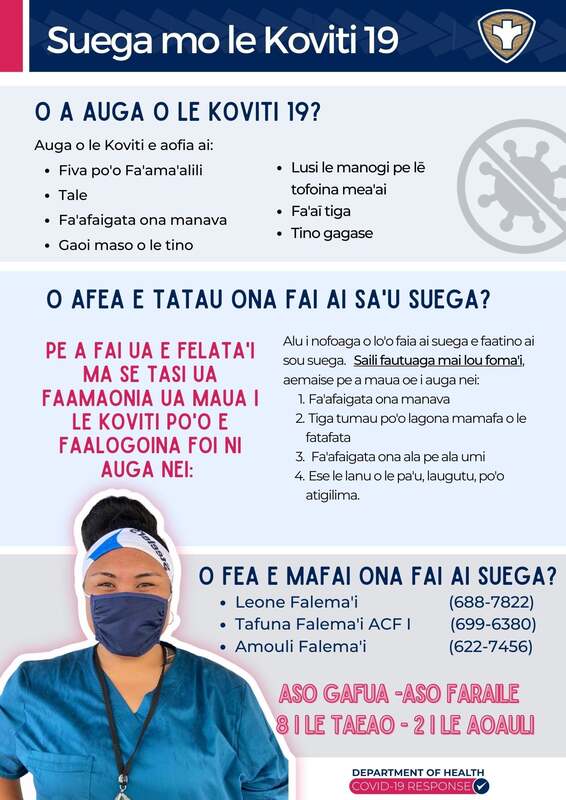 2022-02
2022-02American Samoa COVID-19 Testing Schedule
The American Samoa Department of Health released this flyer in both English and Samoan languages for the public so they would know what time and day COVID testing sites are open, where they are located, and the number to call for each site if they need further information. Not only was this released online but placed in every store of the island. -
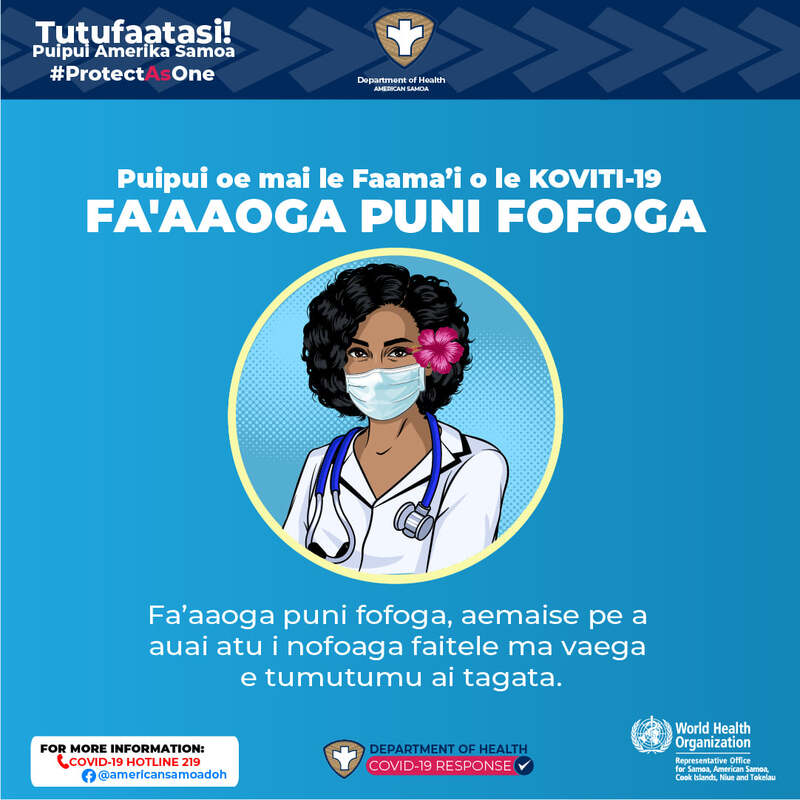 2022-02
2022-02Wear a Mask: Fa'aaoga Puni Fofoga
With the rise of covid cases in American Samoa at the beginning of this year in February, the Department of American Samoa Health Department partnered up with the American Samoa government to make sure that the people of American Samoa are well aware of what to do to combat COVID. It is one of the many flyers and ads released by the ASDOH for the public of American Samoa. They are released in both the English and Samoan languages. This flyer is for people to wear a mask and in the Samoan language, fa'aaoga puni fofoga. -
2022-05-16
Prejudice and Hope during Covid-19
At the beginning of 2021, I spent one of the most memorable fun time in my life with my friends at the Coming of Age ceremony. Two days later, I had one more memorable days in my life, but in a negative mode: I got Covid-19, and it transferred to all my family members. During that time, I felt fear of being perceived as Covid-19-infected by others since a lot of prejudice led by Covid-19 was happening in the world and even in my neighborhood. In this essay, I would like to use my experience to analyze the human selfish and altruistic reactions to the Covid-19 pandemic. When I got infected with Covid-19, I had a high fever of 103 degrees, had difficulty breathing, and could not eat properly for several days. My father was hospitalized for about a week because he kept coughing and had difficulty breathing. The whole family was infected with Covid-19and had to be treated at home and quarantined at home, so we could not go out to buy daily necessities and food. The food that was in the refrigerator was running out with each passing day. At that time, I was afraid to confess to anyone outside my family that I had Covid-19 even though I was cured. The reason for this was that I saw on the news that there was a hate movement against Japanese and Asians living in European countries and the United States around the spring of 2020 when the Covid-19 pandemic began. Later on, as the Covid-19 damage grew, President Trump called the coronavirus the “Chinese virus,” and there were many Asians, including Chinese, who were labeled and discriminated against in the daily news. Even around my home, there were people who looked harshly at people labeled as "corona-infected," "pathogens," or "dangerous people," even if they had been infected with Covid-19 and had already recovered completely. I was afraid that if my neighbors and friends found out that I had Covid-19 and labeled me dishonorably. I thought that the distrust and inter-personal level of hatred that people possess for people who have actually been infected with Covid-19 comes from the “state of nature” that Thomas Hobbes advocated in his writing. Hobbes explains that the state of nature is when humans “seek peace and follow it… by all means [humans] can to defend [themselves]”. The state of war, in which men fight what men perceive as a target (in this case, the threat of the Covid-19) in order to protect themselves, seems to have given rise to this discrimination. And that discriminatory view grew socially and led to the Asian Hate of the time. In addition to the fear held by individuals, I guess the manipulation of social impressions at the time also led to Asian hate. The world was under a medical crunch in all countries following the explosive spread of the Covid-19, and there was a shortage of hospital beds and respiratory equipment. This could be attributed to policies and measures in the medical field that could not respond well to the sudden pandemic or the failure to provide the public with the correct information. However, medical policies and government thinking of the time shifted the blame. They tried to deflect public anger and attention with a different vector, trying to place the responsibility for the entire pandemic on the "Chinese virus" and the Asians. Public opinion, not medical evidence, established the cause of the pandemic, which was similar to what happened in San Francisco, California, hundreds of years ago during a plague epidemic, according to Joan B. Trauner's article. Chinatown in San Francisco was created to isolate immigrants from China during the plague epidemic, and the health office regarded them as the cause of the disaster. The government and the health officer did not want to be responsible for the existence of a plague epidemic. Trauner, in his writing the Chinese as Medical Scapegoats in San Francisco, describes the perspective of the medical officer in San Francisco at the time: "the pronouncements of the board and the health officer were often characterized by political or social expedience, rather than by scientific insight”. The government and the health department utilized the presence of Chinese immigrants for social expediency. The fear, the anger born of fear, and the desire to protect oneself have not changed from the time Hobbes wrote The Leviathan, through Trauner, to the present day in the 21st century. Especially in extraordinary situations like a pandemic, it will lead to new discrimination and more people being treated unfairly. But I have found one hope during this pandemic. During the time my family was homebound, when we had nowhere to go shopping and were finally running out of food, friends of my parents cooked and brought us meals for a few days, bought fruits and household items and delivered them to us. There were even heartful letters written by them. They did not avoid us as "dangerous people" but treated us with compassion. When humanity makes a positive turnaround from looking for the cause of this situation and shifting blame, to working together to overcome the situation that is happening now, we could overcome our fears, become altruistic, and strive to protect humanity as a whole. -
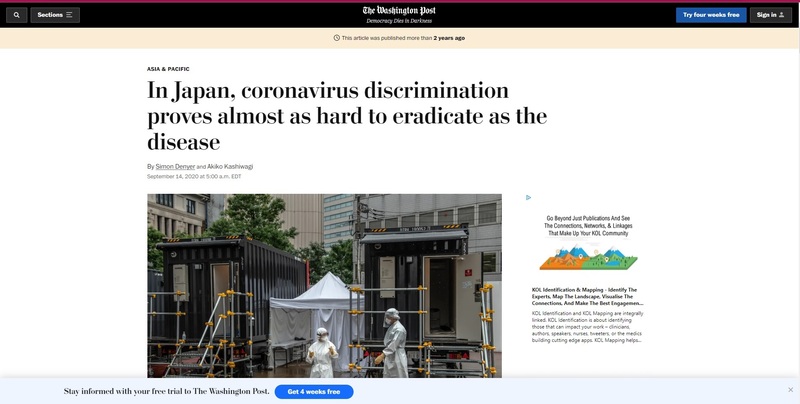 2022-05-16
2022-05-16Stigma During the COVID-19 Pandemic in Japan
During the COVID-19 pandemic, healthcare workers and patients in Japan suffered from the stigma. According to the article, “In Japan, coronavirus discrimination proves almost as hard to eradicate as the disease,” healthcare workers and their families are discriminated against as if they are “germs” that people need to avoid contact with. The patients of the virus are also stigmatized, and such a phenomenon of blaming victims has been seen many times throughout Japanese history. As this article represents, health care workers in Japan were stigmatized and discriminate against because of the potential risks of COVID-19 infections. According to Goffman, the greek definition of stigma “[refers] to bodily signs designed to expose something unusual and bad about the moral status of the signifier” (131). Nowadays, its definition has expanded to negative images of physical and social attributes and their interpretation in a social context. The stigma of healthcare workers in Japan is peculiar to this pandemic, and this could be because the situation overturned the expectations people had about healthcare workers. Healthcare workers are supposed to help people with diseases, but because of the pandemic, they are seen as the ones with higher risks of carrying the virus as they have more interaction with those who have been infected. As a result, people become afraid of interacting with healthcare workers, which made this job stigmatized. The article shows that Japanese people reject to interact with healthcare workers and their families during the pandemic. One of the common consequences of being stigmatized is that stigmatized people become separated from other people as they are treated differently. According to Goffman, “[the] responses of the normal and of the stigmatized that have been considered so far are ones which can occur over protracted periods of time and in isolation from current contacts between normals and stigmatized" (135). As Goffman illustrates, health care workers were stigmatized and separated from society at the beginning of the pandemic. Some people even believe that “the person with a stigma is not quite human” as Goffman states, which lead to an extreme reaction by people around health care workers. For instance, healthcare workers have been receiving death threats because other people see them as if they are the potential source of the disease rather than the same humans who are fighting the pandemic together. Such a reaction is similar to how children bully other children based on differences in attributes. One of the typical ways of bullying is to call someone “germs” and avoid interactions, which is the same as the situation in this article. This pandemic revealed our natural tendency of staying away from others who have negative attributes, which indicates that a pandemic is not an equalizer but a source of discrimination. Another factor that could have contributed to the situation in Japan is social pressure existing in the country. The article mentions that there is strong social pressure in Japan to follow coronavirus directives and to cooperate for stopping the spreading of the virus; if people do not comply, they are strongly criticized or blamed by other Japanese people. In addition, surveys have shown that compared to Americans or Britons, more Japanese people agree with the idea that “If someone is infected with the coronavirus, I think it is their fault” (Denyer and Kashiwagi). According to Fei, there are behavioral norms that are maintained by tradition, called “ritual norms” (97). This kind of norm is regarded as moral behavior by people of the community so that they follow the norms regardless of laws or punishments (99). Although Fei discusses Chinese rural society, such norms have been established in Japan as well because Japanese society developed as an agricultural society where people in a community need to cooperate with each other. There used to be a tradition called murahachibu, which means excluding those who break the rules from 80 percent of social activities in the village with the exception of funerals and fires. Even though this practice is rarely seen in modern society, people still have a strong pressure to behave for the sake of society in order to maintain harmony. For example, Japanese people still feel obligated to wear masks after vaccines have been promoted even though there is no rule or punishment for not wearing masks. This feeling may occur because they believe it is moral or correct to refrain from doing something that possibly spreads the virus. Healthcare workers were not the only people who suffered from stigma, but COVID-19 patients were also blamed for their behavior that possibly contributed to their infection. In the article, a Japanese psychology professor mentions “a low tolerance for uncertainty” in Japanese people, indicating that they blame the patients to reduce their own fears derived from the uncertainty of the pandemic. This implies that COVID-19 patients become scapegoats for the pandemic itself. In the reading, Trauner writes that “the general acceptance of the germ theory in the 1880’s did little to dispel the popular belief that epidemic outbreaks were directly attributable to conditions within Chinatown” (73). This indicates that when people are uncertain about something scary, they try to identify what or who causes that disease or threat. Although people know that coronavirus is the cause of this pandemic, most people are afraid of germs and viruses because they are invisible. The article also demonstrates some cases of blaming victims in Japanese history, including leprosy patients, survivors of the 1945 atomic bombings, and evacuees of the 2011 Fukushima disaster. Such diseases and disasters involve complicated factors, so it is difficult to blame the causes directly. Therefore, individuals tend to blame patients or carriers of the virus during the pandemic instead of blaming the virus itself because they are visible and easy to avoid. References Erving Goffman (1976) “Stigma” :Chapter 10 “Selections from Stigma” Fei Xiaotong (1947) “From the Soil: the Foundations of Chinese Society” Joan B. Trauner, (1978) “The Chinese as Medical Scapegoats in San Francisco, 1870-1905 Simon Denyer and Akiko Kashiwagi (2020) “In Japan, coronavirus discrimination proves almost as hard to eradicate as the disease” -
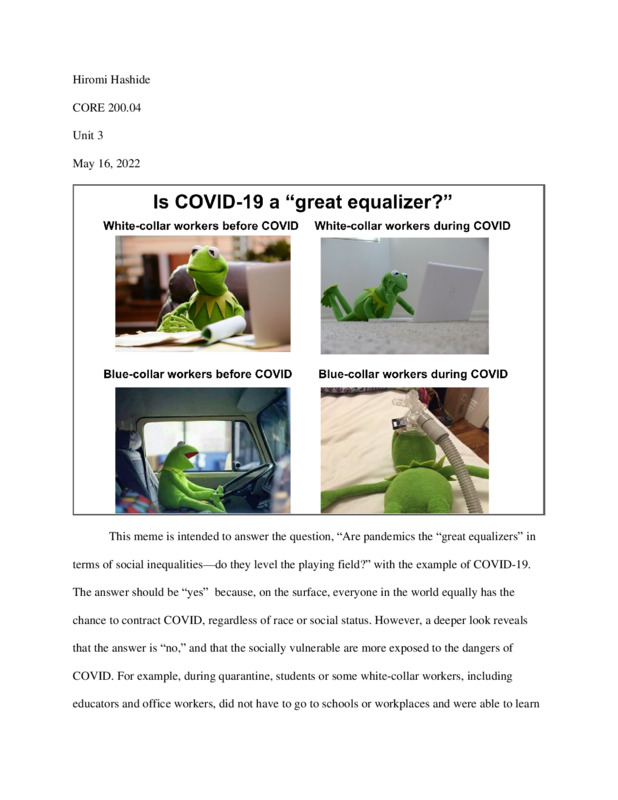 2020-05-16
2020-05-16Is COVID-19 a "Great Equalizer?" [DUPLICATE]
I made two memes. The first meme is intended to answer the question, “Are pandemics the “great equalizers” in terms of social inequalities—do they level the playing field?” with the example of COVID-19. And the meme says the answer is “no,” and that the socially vulnerable are more exposed to the dangers of COVID. The second meme is intended to answer the question, “Have you observed any patterns of human behavior with the Covid-19 pandemic?” Former President Trump called COVID the “China Virus” and fueled people’s hatred of Asians. This meme tries to remind the audience of his negative remarks but in a humorous way without offending Asian populations. It also illustrates how words can magnify feelings of racism, fear, and uncertainty, which can result in scapegoating. This meme gives the audience an opportunity to learn more about the unfair treatment of Asians during the pandemic and why it happened. -
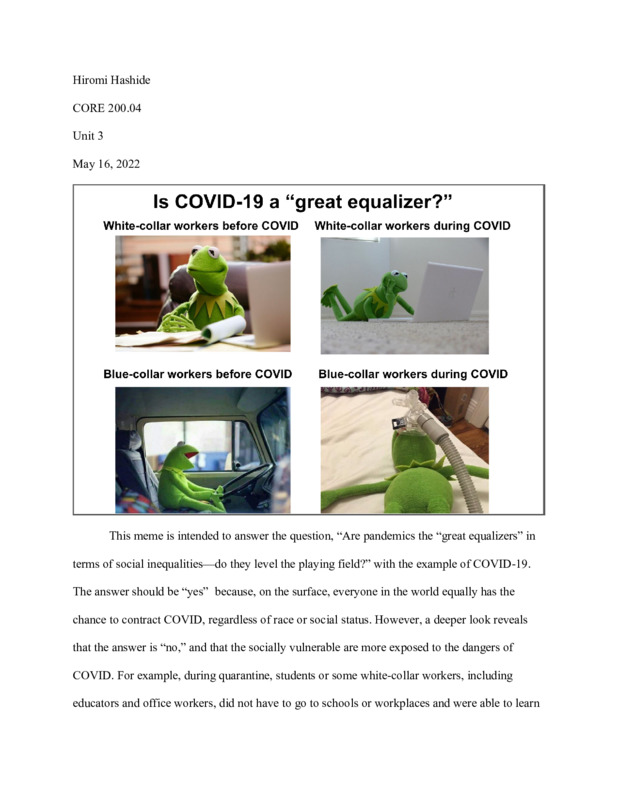 2000-05-16
2000-05-16Is COVID-19 a "Great Equalizer?"
I made two memes. The first meme is intended to answer the question, “Are pandemics the “great equalizers” in terms of social inequalities—do they level the playing field?” with the example of COVID-19. And the meme says the answer is “no,” and that the socially vulnerable are more exposed to the dangers of COVID. The second meme is intended to answer the question, “Have you observed any patterns of human behavior with the Covid-19 pandemic?” Former President Trump called COVID the “China Virus” and fueled people’s hatred of Asians. This meme tries to remind the audience of his negative remarks but in a humorous way without offending Asian populations. It also illustrates how words can magnify feelings of racism, fear, and uncertainty, which can result in scapegoating. This meme gives the audience an opportunity to learn more about the unfair treatment of Asians during the pandemic and why it happened. -
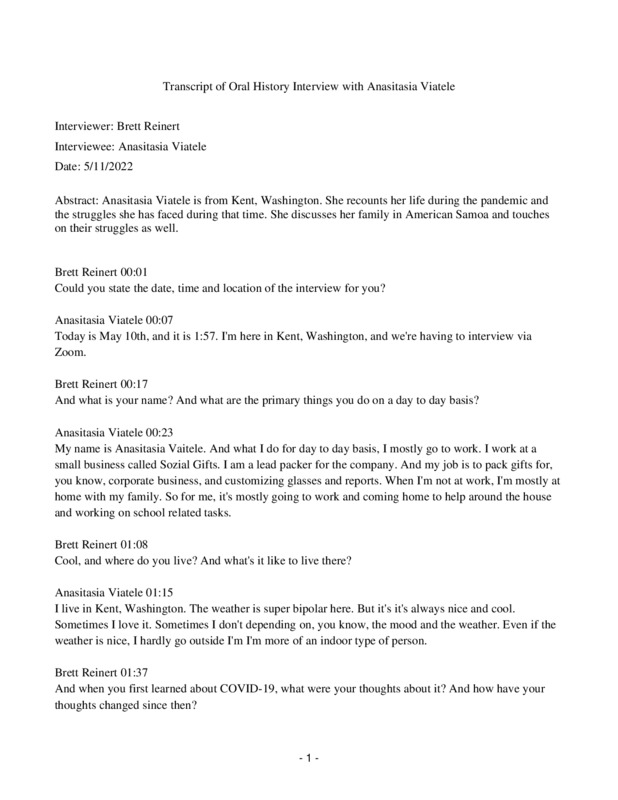 2022-05-10
2022-05-10Anasitasia Viatele Oral History, 2022/05/15
Anasitasia Viatele is from Kent, Washington. She recounts her life during the pandemic and the struggles she has faced during that time. She discusses her family in American Samoa and touches on their struggles as well. -
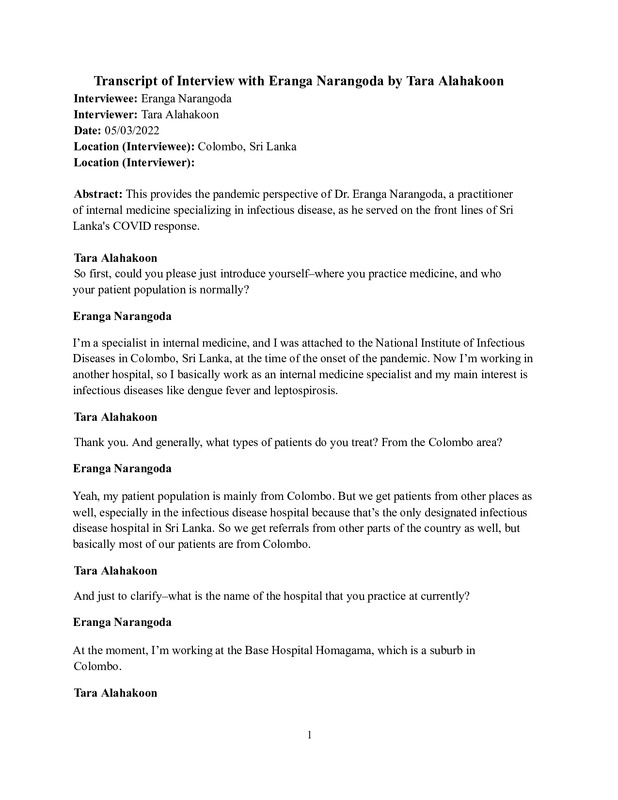 2022-05-03
2022-05-03Eranga Narangoda Oral History, 2022/05/03
It provides the pandemic perspective of Dr. Eranga Narangoda, a practitioner of internal medicine specializing in infectious disease, as he served on the front lines of Sri Lanka's COVID response. -
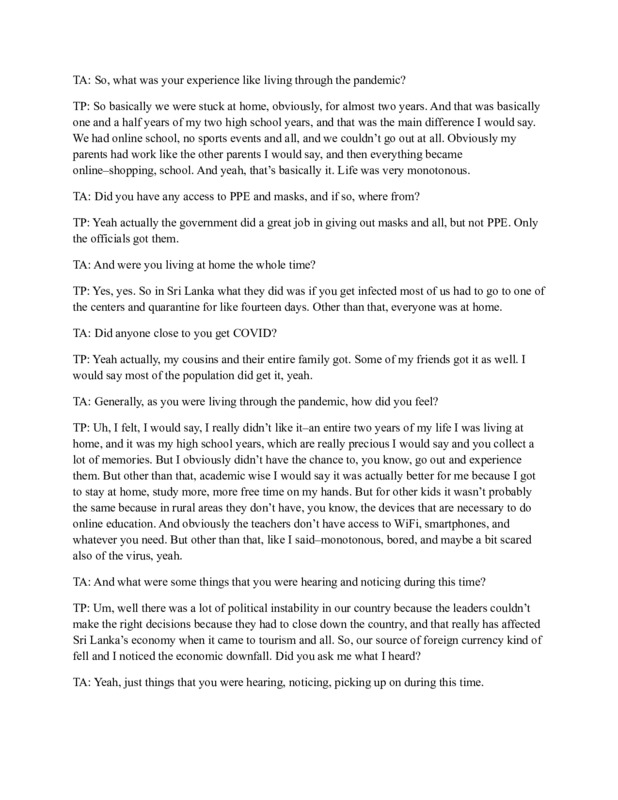 2022-05-04
2022-05-04Experiencing the Pandemic as a Student in Sri Lanka
It provides the pandemic perspective of a student from Colombo, Sri Lanka. -
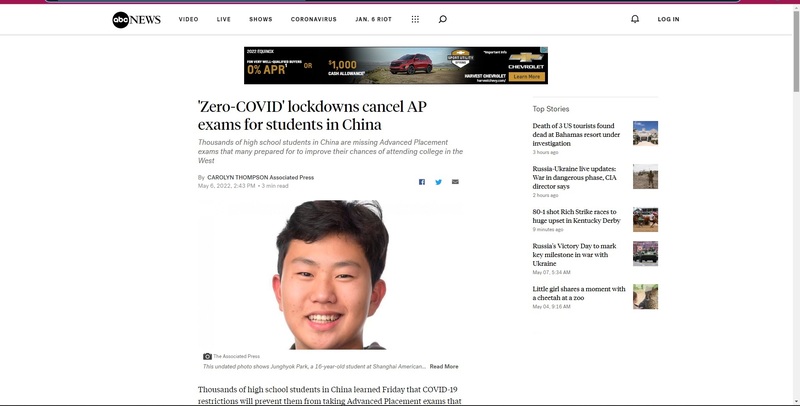 2022-05-06
2022-05-06'Zero-COVID' lockdowns cancel AP exams for students in China
This is a news story from ABC News by Carolyn Thompson. Due to China's COVID policy, the Advanced Placement (AP) tests have been canceled due to restrictions. Students are unable to visit for in-person tests that are used for AP tests. The College Board offered an online version of these tests, but that was only intended to be temporary. Some tests are being offered digitally, such as the ACT. The SAT remains impacted due to restrictions. Parents have accused The College Board of being indifferent to affected students that need these tests. -
2022
Experience of COVID-19 in China and USA
As an international student, I have witnessed the spread of covid-19 in both China and the United States. While the virus harms humans in the same way, each country does it differently to humans facing the pandemic. I was in high school in Boston when the covid first broke out (in December?). At that time, there were only two cases in Boston, so everyone didn't care much about the virus far across the ocean. As a Chinese, I know that coronavirus has caused countless pain in Wuhan, China. Therefore, I wrote a petition to the school to advocate wearing masks at school to avoid infection. However, the absurdity of things is far beyond my imagination. My high school principal sent an email to all international students (most of us are Asians) telling us that masks do not help people stay away from the virus. He also required us not to wear masks in school because it would cause panic among other local students. This implicit discrimination against Asians is a hurt. In March, I decided to return to China from the US to visit my family. It was a tough decision, not only in the sense of risking my life but in the process. I overcame the flight's cutting off and was cancelled by seven flights to get on the plane home. But when I finally returned to China and was quarantined for 14 days, I discovered the maliciousness toward international students on the Internet. Everyone was repeating the sentence, "you can't serve the motherland, but you can be the first to poison your country flying from thousands of miles away". This exclusion of outsiders is another harm. These hurt far more than covid did to me. -
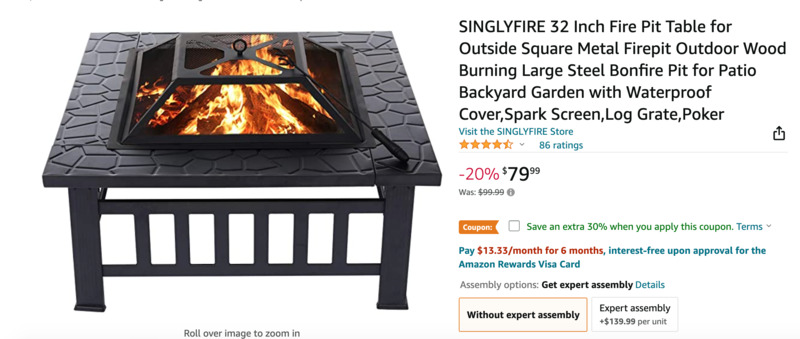 2020-04-03
2020-04-03My Neighbors and I
My neighbors and I have known each other for multiple years, and are good friends. They came from India as immigrants back in 2000 and started a family, eventually moving in right next to us about two years before the pandemic. Once COVID hit, our usual Saturday night bonfires together came to a halt as we wanted to be safe and not spread the potential infection. Instead, they bought an entire fire pit off Amazon, and through the trees each Saturday night we continued our Saturday night bonfires together, just not next to each other. This was honestly a beautiful experience because no matter what we found a way to continue to connect with each other in a safe and timely manner! We still keep in contact to this day and reminisce on our old memories as neighbors. -
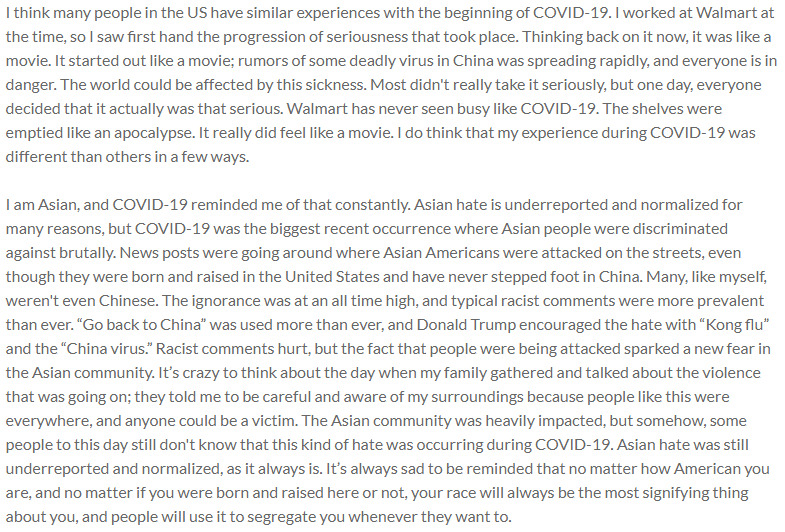 2022-04-25
2022-04-25Being Asian During COVID-19
I think many people in the US have similar experiences with the beginning of COVID-19. I worked at Walmart at the time, so I saw first hand the progression of seriousness that took place. Thinking back on it now, it was like a movie. It started out like a movie; rumors of some deadly virus in China was spreading rapidly, and everyone is in danger. The world could be affected by this sickness. Most didn't really take it seriously, but one day, everyone decided that it actually was that serious. Walmart has never seen busy like COVID-19. The shelves were emptied like an apocalypse. It really did feel like a movie. I do think that my experience during COVID-19 was different than others in a few ways. I am Asian, and COVID-19 reminded me of that constantly. Asian hate is underreported and normalized for many reasons, but COVID-19 was the biggest recent occurrence where Asian people were discriminated against brutally. News posts were going around where Asian Americans were attacked on the streets, even though they were born and raised in the United States and have never stepped foot in China. Many, like myself, weren't even Chinese. The ignorance was at an all time high, and typical racist comments were more prevalent than ever. “Go back to China” was used more than ever, and Donald Trump encouraged the hate with “Kong flu” and the “China virus.” Racist comments hurt, but the fact that people were being attacked sparked a new fear in the Asian community. It’s crazy to think about the day when my family gathered and talked about the violence that was going on; they told me to be careful and aware of my surroundings because people like this were everywhere, and anyone could be a victim. The Asian community was heavily impacted, but somehow, some people to this day still don't know that this kind of hate was occurring during COVID-19. Asian hate was still underreported and normalized, as it always is. It’s always sad to be reminded that no matter how American you are, and no matter if you were born and raised here or not, your race will always be the most signifying thing about you, and people will use it to segregate you whenever they want to. -
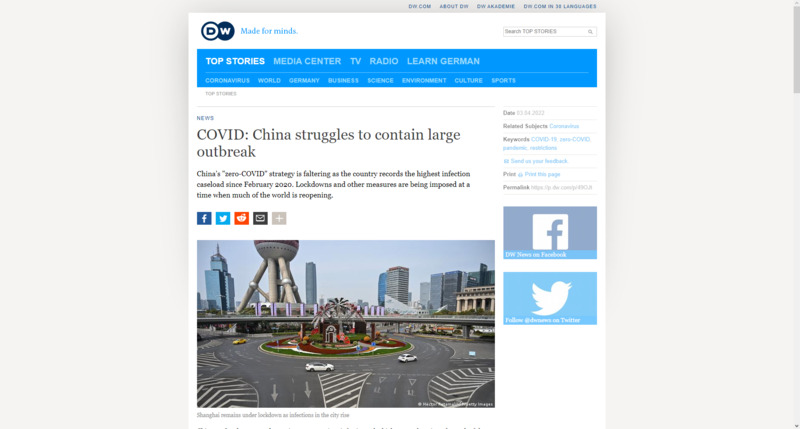 2022-04-03
2022-04-03COVID: China struggles to contain large outbreak
This is a news story by DW News. It is a story about how the outbreak of COVID has not been very well controlled in China, with China reporting 13,146 new cases, the most since the beginning of the pandemic in 2020. Despite these numbers, the Chinese government has claimed that there have been no new deaths despite the high number of infections. Shanghai is the worst affected region in China, in which as city of 25 million has been under lockdown. Vice President Sun Chunlan, who is on the Communist Party's Politburo claims that swift actions taken will help stop the spread of the virus. In Beijing, there have been lockdowns, mass testing, and travel restrictions placed on the populace. Residents of Shanghai are worried about the lockdowns exceeding four days, as it will limit their ability to obtain fresh food. Parents also fear being separated from their children for too long under strict quarantine. The article mentions Xi being in tough spot with this too, as these lockdowns will have an ill effect on an already fragile economic situation. -
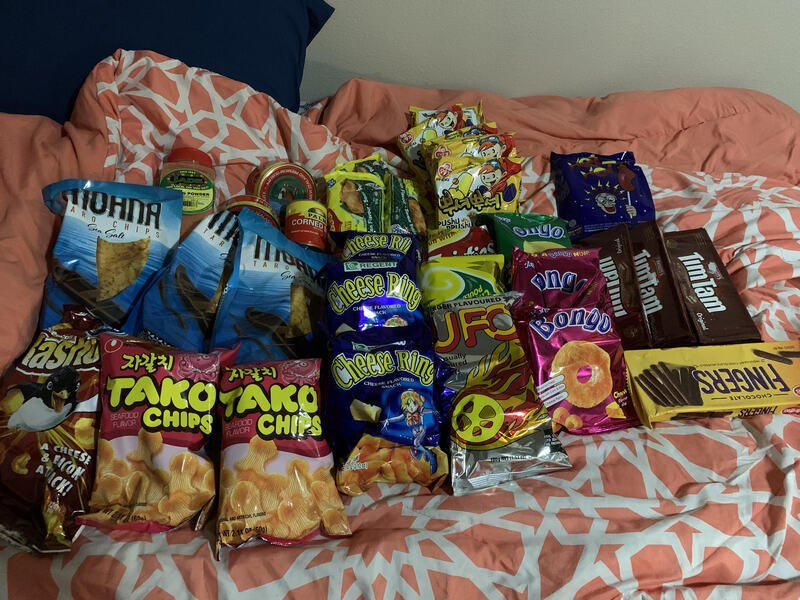 2020-12-14
2020-12-14Holiday Care Packages
Three years ago, COVID-19 barred many people from traveling back home, and my roommates and I were one of those people. We all came from American Samoa, and while we planned to return home for the summer, thanksgiving, and Christmas, we could not do that. I remember working a part-time job during school to save up just enough to pay for my roundtrip fare, but unfortunately, COVID changed that. Although we could not have the chance to return home for the holidays, our families made it possible to bring the taste of island snacks to St. George with the constant sending of care packages. The photo I uploaded showed one of the many care packages my family sent me from home, which meant a lot to me. My roommates and I were very homesick, but our families came through with the snacks from home. I remember eagerly checking and refreshing the USPS app to track my package. It became my favorite thing to do during the COVID shutdown. -
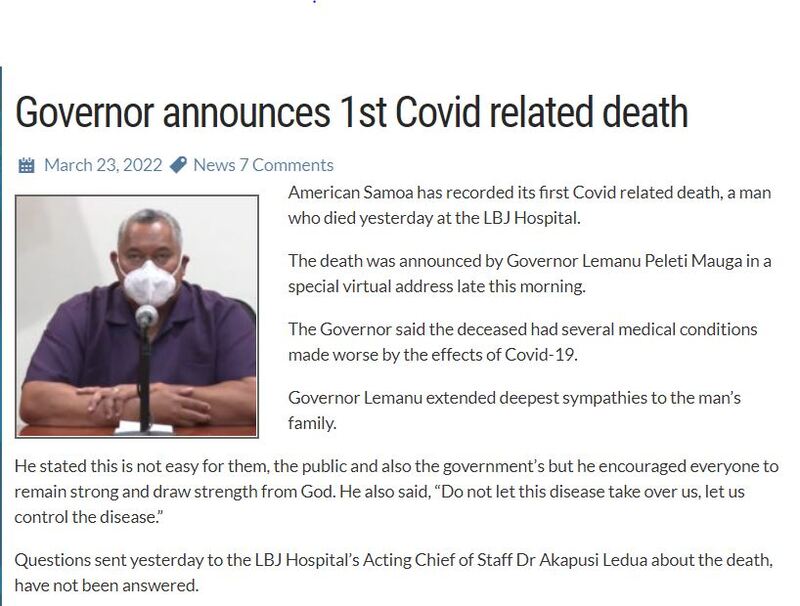 2022-03-23
2022-03-23First Covid Related Death in American Samoa
On March 23, 2022, American Samoa reported its first Covid Death. This article was released on Talanei News with the Governor sending his sincere condolences to the man's family. With the surging number of cases in American Samoa from 555 last month to 2000 plus recently, the Governor went live on the local news when the first covid related death was reported to express his sympathies and to the public never to lose hope and to keep fighting against the disease. After two years, American Samoa had just experienced its first covid related death, making everyone worried that more deaths would come. And sadly, I think there will be. I have seen how COVID deaths have increased globally for the past two years, and as much as I do not want to think about it, I know it will be bound to happen. And just like me, the American Samoa public worries that since it is a tiny island, COVID-related deaths will spread quickly. When I saw this article on Talanei News, I immediately began to worry. I felt like I also lost a family member thinking about my parents. Experiencing death is never easy, and COVID has brought a lot of sadness. This article gave me fear, worries, and sadness altogether. This is why this article is essential to me as it informed important information about home during the drastic times of COVID and death. -
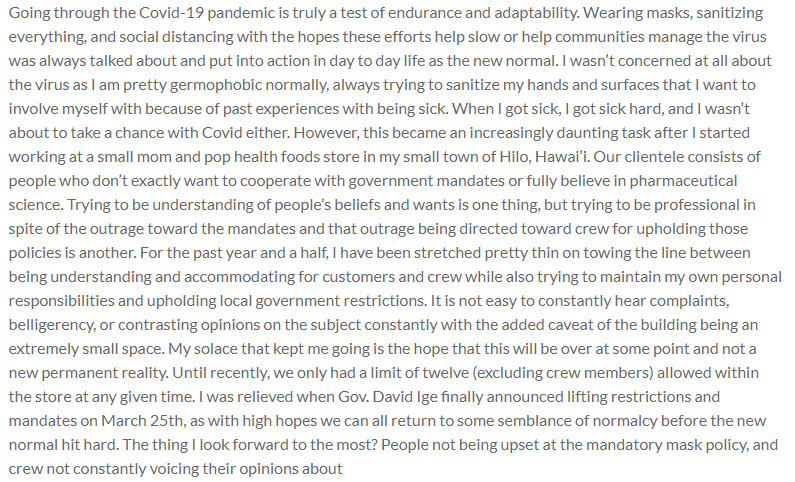 2022-03-17
2022-03-17Working Through The Pandemic
Going through the Covid-19 pandemic is truly a test of endurance and adaptability. Wearing masks, sanitizing everything, and social distancing with the hopes these efforts help slow or help communities manage the virus was always talked about and put into action in day to day life as the new normal. I wasn’t concerned at all about the virus as I am pretty germophobic normally, always trying to sanitize my hands and surfaces that I want to involve myself with because of past experiences with being sick. When I got sick, I got sick hard, and I wasn’t about to take a chance with Covid either. However, this became an increasingly daunting task after I started working at a small mom and pop health foods store in my small town of Hilo, Hawai’i. Our clientele consists of people who don’t exactly want to cooperate with government mandates or fully believe in pharmaceutical science. Trying to be understanding of people’s beliefs and wants is one thing, but trying to be professional in spite of the outrage toward the mandates and that outrage being directed toward crew for upholding those policies is another. For the past year and a half, I have been stretched pretty thin on towing the line between being understanding and accommodating for customers and crew while also trying to maintain my own personal responsibilities and upholding local government restrictions. It is not easy to constantly hear complaints, belligerency, or contrasting opinions on the subject constantly with the added caveat of the building being an extremely small space. My solace that kept me going is the hope that this will be over at some point and not a new permanent reality. Until recently, we only had a limit of twelve (excluding crew members) allowed within the store at any given time. I was relieved when Gov. David Ige finally announced lifting restrictions and mandates on March 25th, as with high hopes we can all return to some semblance of normalcy before the new normal hit hard. The thing I look forward to the most? People not being upset at the mandatory mask policy, and crew not constantly voicing their opinions about -
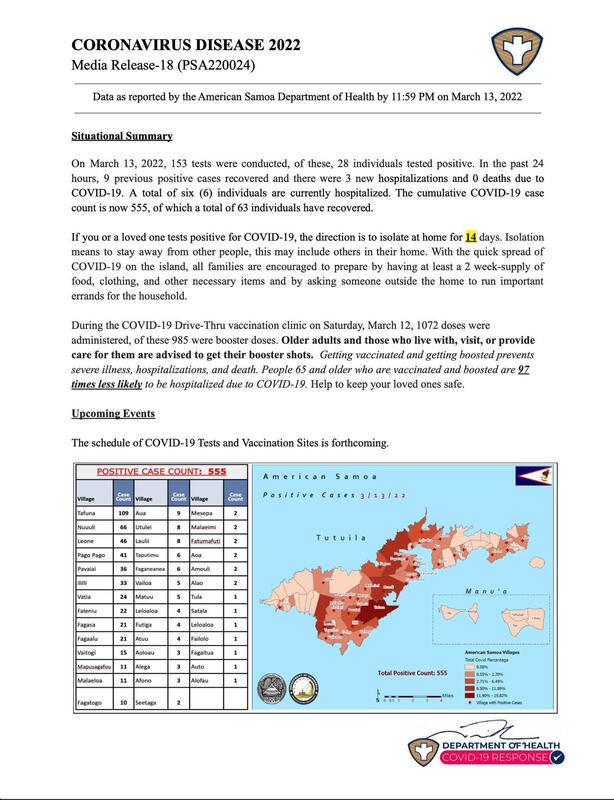 2022-03-16
2022-03-16COVID Surge in American Samoa
American Samoa, a small U.S territory located in the South Pacific, was the last place to experience the surging numbers of covid cases. When the coronavirus was declared a pandemic at the beginning of 2020, American Samoa was the only place on earth not to have any cases of COVID. To combat the disease, the government of American Samoa barred incoming flights for a whole year from the United States and their neighboring island of Western Samoa. Although the island did not have any COVID cases, the government promoted and maintained the restrictions throughout the island. However, after opening the borders for inbound flights after a year, American Samoa did not report its first Covid case until September 2021. Since then, travel restrictions and quarantine for travelers were enforced, but eventually, a big surge of cases began to be seen in mid-February of this year. The opening of borders to inbound flights brought the disease into the island. Coronavirus cases jumped from only a hundred to 555. It is still considered relatively low worldwide, but it is high for a small island. Fortunately, no fatalities are reported, with more than 80 percent of the population vaccinated. The attached image is data reported weekly by the American Samoa Department of Health to the public to show how many cases are positive in each village and totaled in American Samoa. The people were worried that the disease might cause some fatalities, the government was quick to impose a lockdown restriction called "CODE RED," which barred social gatherings, schools, traveling, and work on February 22. Although the public panicked with the news of coronavirus cases on the island, the government worked to assure the safety of the people by making sure people were aware of the number of cases and the situation with live news updates and weekly data by the Department of Health. I was also worried when I first heard of the surging number of COVID cases at home. Although I moved to the states for school, I made sure I am kept up to date with what is happening back at home. With the fatalities I saw here in the states with Covid, I was also worried for my parents. But it was comforting to see the live updates by the government on social media which kept me closer to home. -
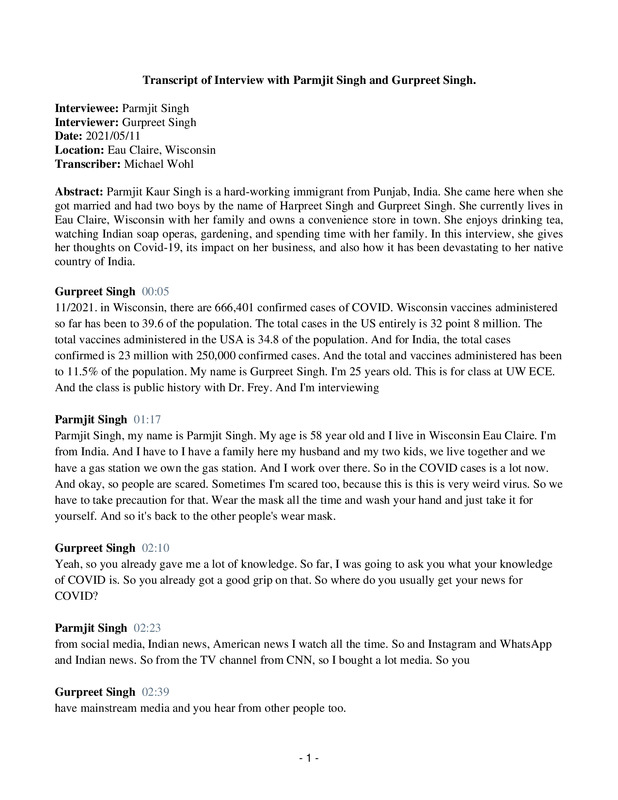 05/11/2021
05/11/2021Parmjit Singh Oral History, 2021/05/11
Parmjit Kaur Singh is a hard-working immigrant from Punjab, India. She came here when she got married and had two boys by the name of Harpreet Singh and Gurpreet Singh. She currently lives in Eau Claire, Wisconsin with her family and owns a convenience store in town. She enjoys drinking tea, watching Indian soap operas, gardening, and spending time with her family. In this interview, she gives her thoughts on Covid-19, its impact on her business, and also how it has been devastating to her native country of India. -
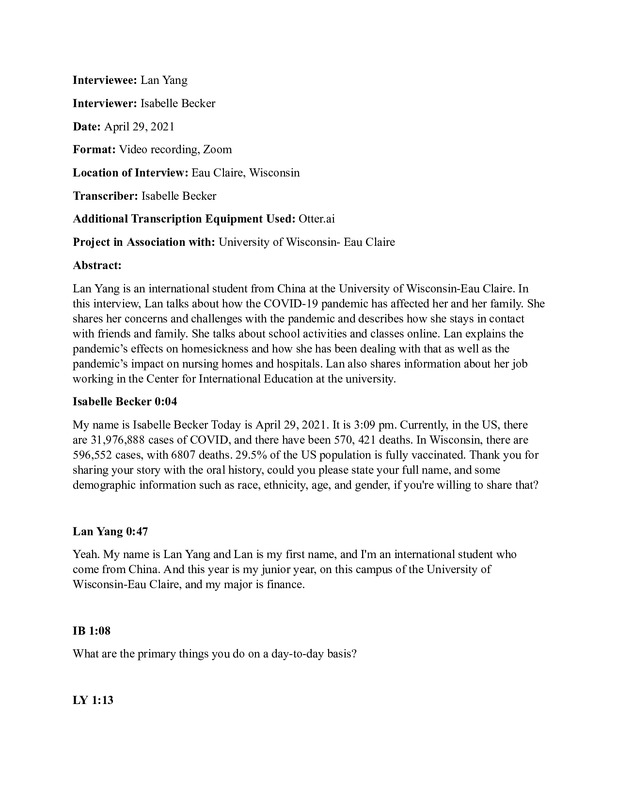 04/29/2021
04/29/2021Lan Yang Oral History, 2021/04/29
Lan Yang is an international student from China at the University of Wisconsin-Eau Claire. In this interview, Lan talks about how the COVID-19 pandemic has affected her and her family. She shares her concerns and challenges with the pandemic and describes how she stays in contact with friends and family. She talks about school activities and classes online. Lan explains the pandemic’s effects on homesickness and how she has been dealing with that as well as the pandemic’s impact on nursing homes and hospitals. Lan also shares information about her job working in the Center for International Education at the university. -
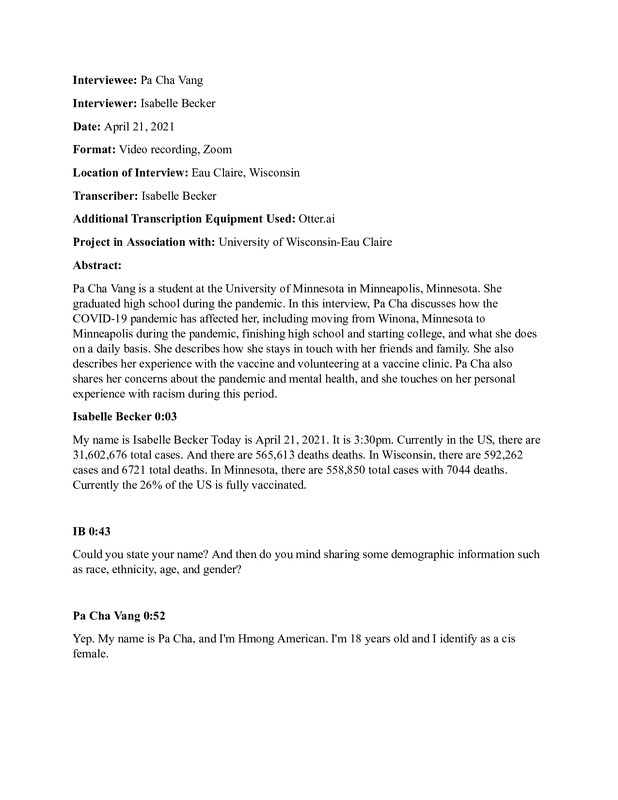 04/21/2021
04/21/2021Pa Cha Vang Oral History, 2021/04/21
Pa Cha Vang is a student at the University of Minnesota in Minneapolis, Minnesota. She graduated high school during the pandemic. In this interview, Pa Cha discusses how the COVID-19 pandemic has affected her, including moving from Winona, Minnesota to Minneapolis during the pandemic, finishing high school and starting college, and what she does on a daily basis. She describes how she stays in touch with her friends and family. She also describes her experience with the vaccine and volunteering at a vaccine clinic. Pa Cha also shares her concerns about the pandemic and mental health, and she touches on her personal experience with racism during this period. -
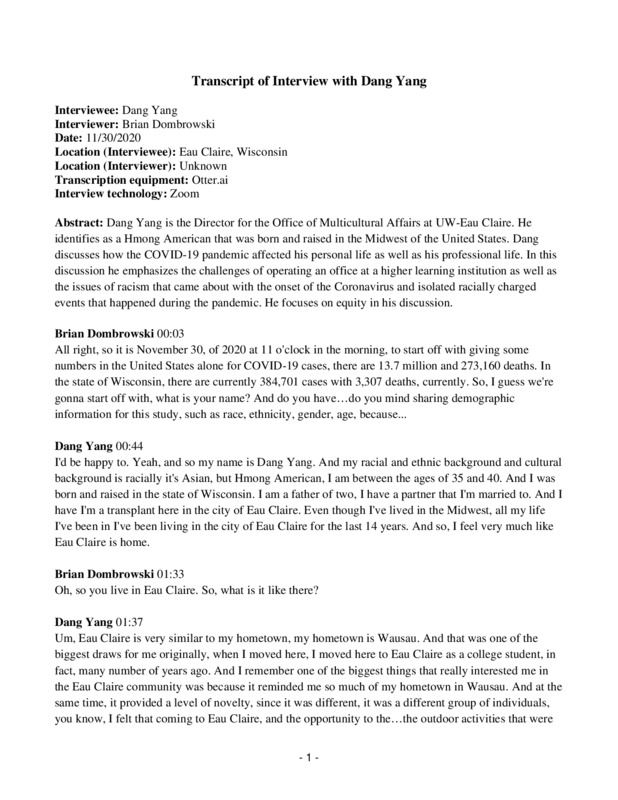 11/30/2020
11/30/2020Dang Yang Oral History, 2020/11/30
Dang Yang is the Director for the Office of Multicultural Affairs at UW Eau Claire. He identifies as a Hmong American that was born and raised in the Midwest of the United States. Dang discusses how the COVID-19 pandemic affected his personal life as well as his professional life. In this discussion he emphasizes the challenges of operating an office at a higher learning institution as well as the issues of racism that came about with the onset of the Coronavirus and isolated racially charged events that happened during the pandemic. He focuses on equity in his discussion. -
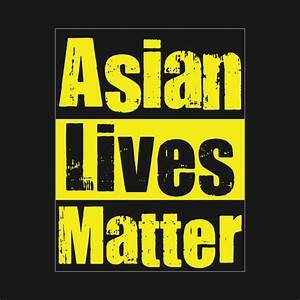 2021-12-16
2021-12-16Asian Lives Matter
When I went to summer camp, I spoke Chinese to my friends who could not speak english very well. However, we were constantly told that "this is America" and we needed to speak english so everyone could understand and didn't feel left out. -
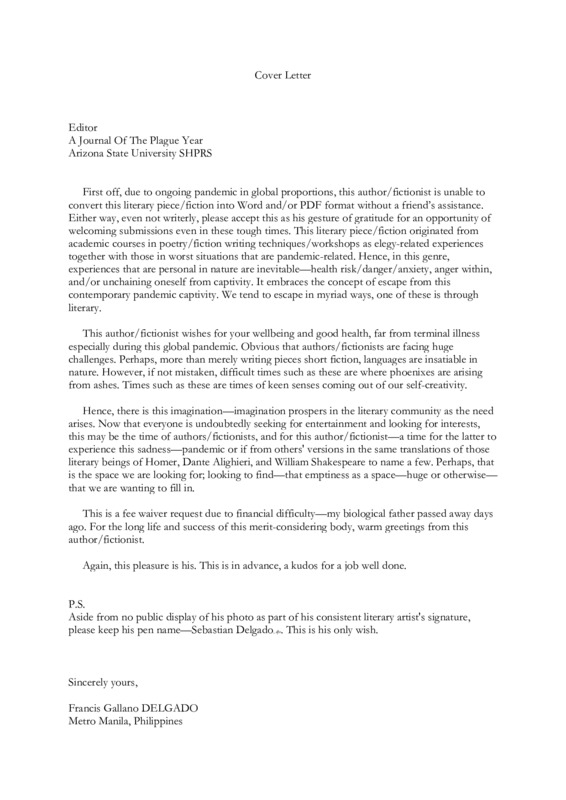 2021-09-05
2021-09-05EPITAPH an excerpt from an epistle by Sebastian Delgado, dps
[CURATOR'S NOTE] This is an piece of fiction submitted to the archive by the author. -
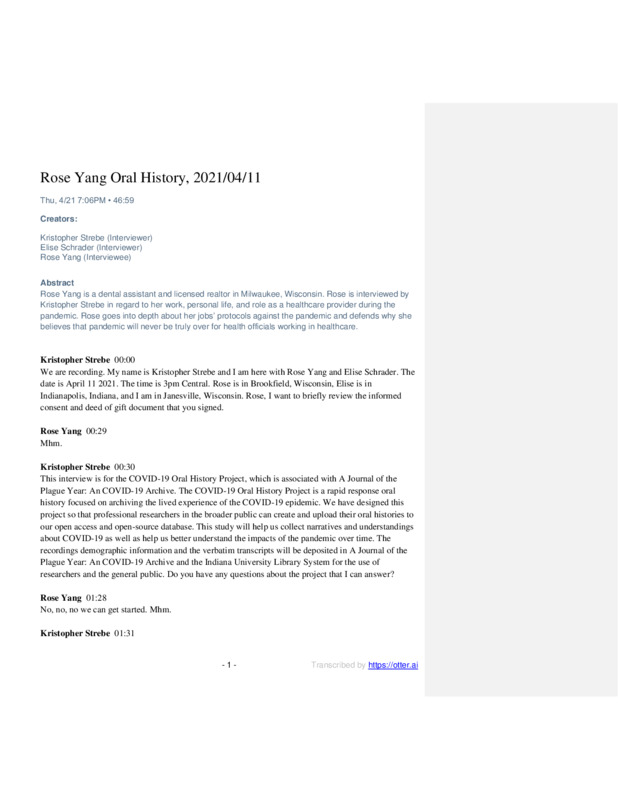 05/02/2021
05/02/2021Yang Rose Oral History, 2021/04/11
Rose Yang is a dental assistant and licensed realtor in Milwaukee, Wisconsin. Rose is interviewed by Kristopher Strebe in regard to her work, personal life, and role as a healthcare provider during the pandemic. Rose goes into depth about her jobs’ protocols against the pandemic and defends why she believes that pandemic will never be truly over for health officials working in healthcare. -
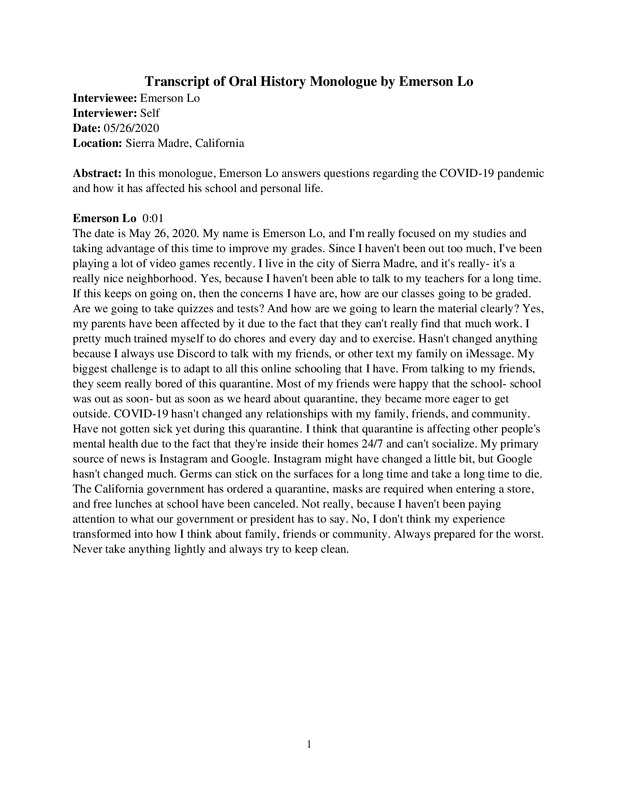 2020-05-26
2020-05-26Lo_Emerson_
C19OH -
2021-10-14
Suffering of My Relatives From COVID-19
Here is a story of how the pandemic affected some relatives of mine who currently live in India. Specifically, they live in Bangalore, in South India. Between January and February of this year, they caught the COVID-19 disease. Perhaps they got it while they were in the central city shopping area doing routine shopping. In any case, it afflicted my relatives strongly. Two of them died, having succumbed to COVID-19. A significant way in which the disease tormented them was in their loss of sense of taste. Once COVID-19 affected them, beyond experiencing much fatigue, chills, and body aches, they could not taste anything. My affected aunt had apparently claimed, "Everything tastes like mud." The loss of taste, fatigue, chills, fever, and breathing difficulty are standard symptoms for the COVID-19 disease, which may appear 2-14 days after exposure to the virus. Also, the pandemic affects different individuals in different ways. The disease progresses in its affecting people, with mild symptoms eventually developing to severe illness. Unfortunately, until the COVID-19 symptoms passed, quarantine measures were taken against my relatives; they were confined within their apartments. As I am close to these people not physically but in a familial sense - as I am currently living in the US – their suffering had a great emotional impact on me; and their welfare means much to me. l can also empathize with Indian COVID-19 suffering, especially the notion of suffering due to lack of taste. Indian culture greatly values cuisine, and taste is an associated factor of cuisine; therefore, loss of taste is quite significant. -
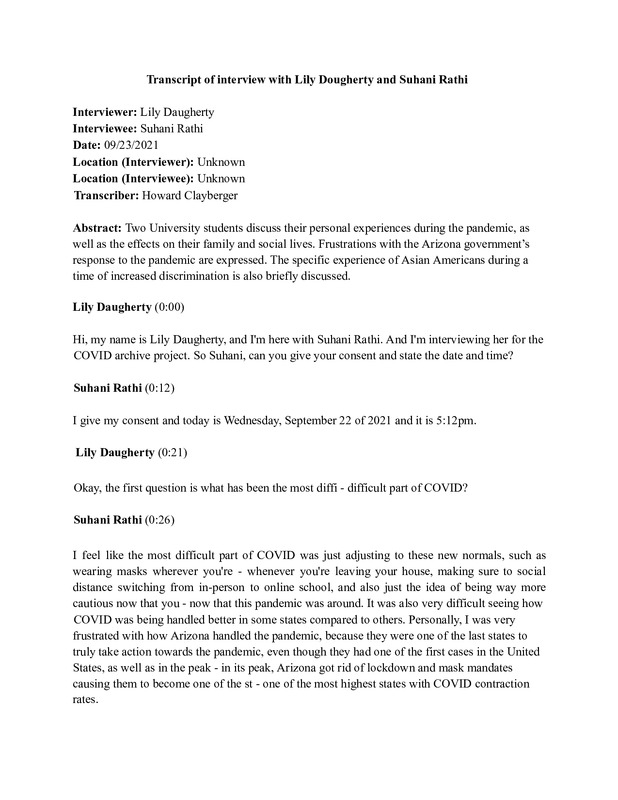 2021-09-23
2021-09-23Lily Daugherty and Suhani Rathi Oral History, 2021/09/23
Two University students discuss their personal experiences during the pandemic, as well as the effects on their family and social lives. Frustrations with the Arizona government’s response to the pandemic are expressed. The specific experience of Asian Americans during a time of increased discrimination is also briefly discussed. -
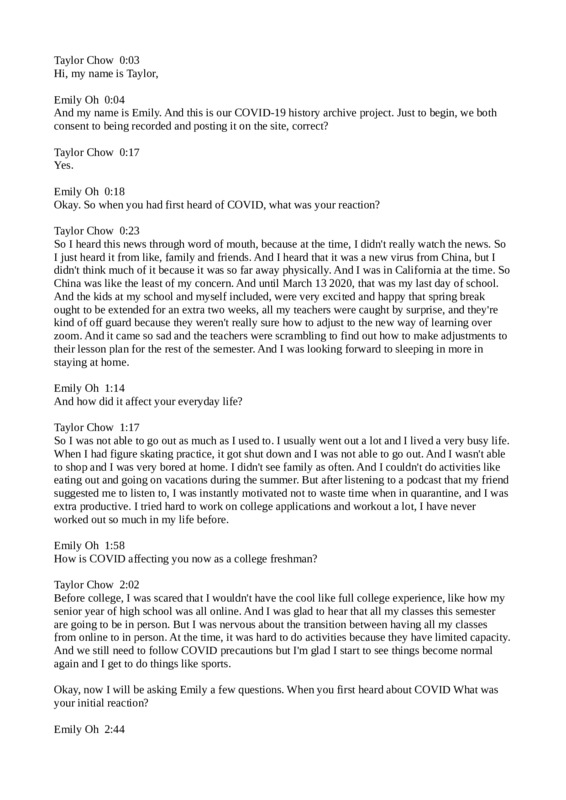 2021-09-24
2021-09-24COVID-19 Archive Project
Two students interview each other about the pandemic and how it affected their life. -
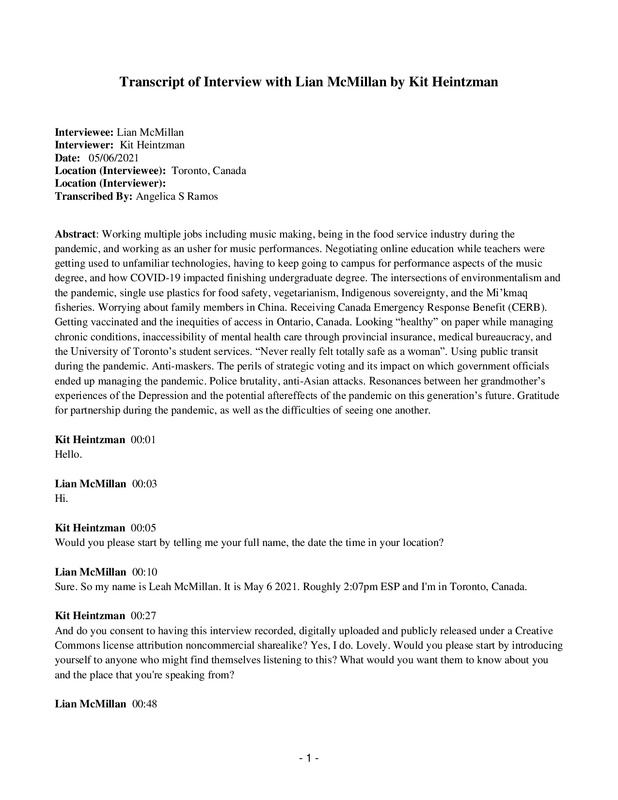 2021-05-06
2021-05-06Lian McMillan Oral History, 2021/05/06
Self Description: “I’m a 21-year-old musician. I just recently graduated from U[niversity] of T[oronto] a week ago, and I graduated with a classical percussion degree. I play for a band called cutsleeve. We’re a group of east Asian, queer sound musicians. I’m a mixed race woman, my father is white, and my mother is Chinese. I’ve lived in Canada, the [United] States, and I lived in Shanghai for a few years. I’m a dog owner.” -
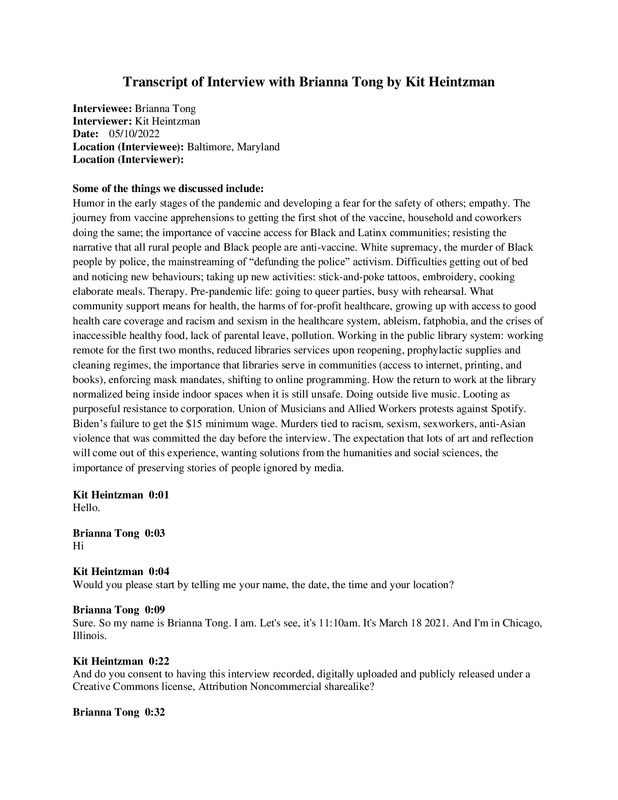 2021-03-18
2021-03-18Brianna Tong Oral History, 2021/03/18
Self description: “I am sitting in my bed right now as I’ve done for a lot of this quarantine. In regular times and I guess still now, I’m in three bands and I also work at the library, the public library. So I’ve been working there in person since we came back to work in May. I was contacted for this interview through Bussy Kween Power Trip, which is a Black queer punk band with three people, no guitars, so my close friends. I’m in two other bands. One band is called Je’raf and one is called Cordoba. And one person each from Bussy Kween is in each of those bands. Haven’t played a show in forever. I can give a little about what I look like or am like. I’m a woman. I’m 26, almost 27 I guess. I’m Black and Asian. I’m kinda short. And during this pandemic I’ve been in general super lucky to have a job still and a great living situation. And I met my partner right before the pandemic, so we’ve been chilling a lot and that’s been amazing. She is so great. Yeah, just going to work and working on all kinds of things in my home. And sometimes having the energy to do a bunch of music and crafts and other art things, and sometimes laying in bed for a full day.” -
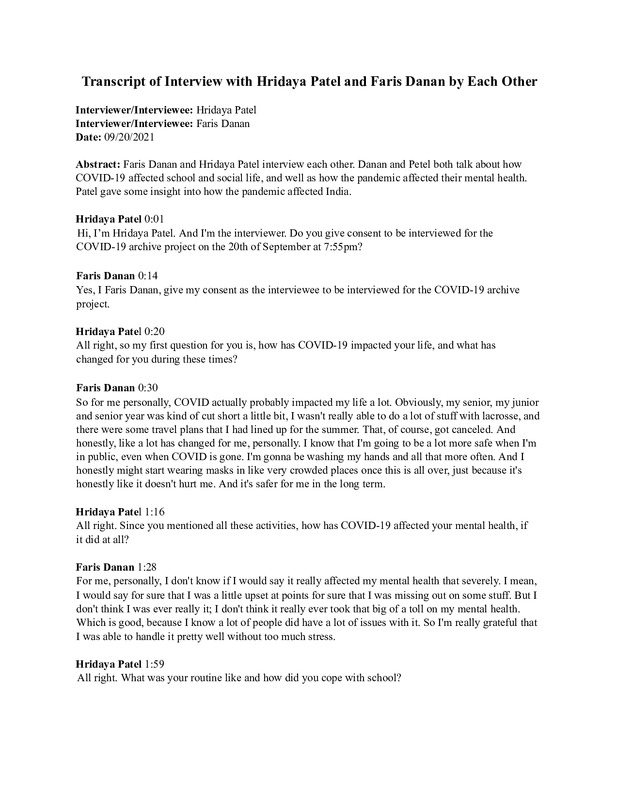 2021-09-20T19:35:00+00:00
2021-09-20T19:35:00+00:00Faris Danan and Hridaya Patel Oral History, 09/20/2021
This object shares both of our experiences with the COVID-19 pandemic -
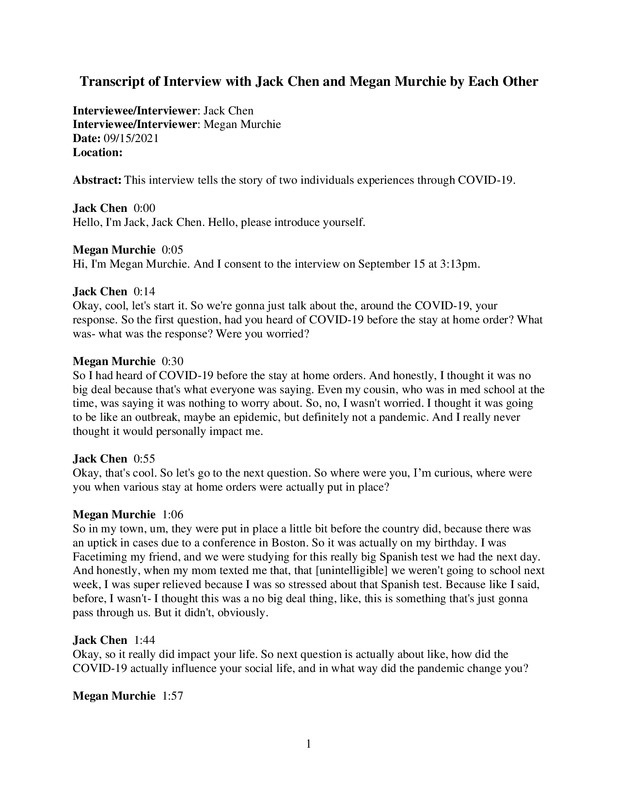 2021-09-15
2021-09-15Jack and Megan; Covid-19 Stories
This podcast tells the story of two individuals experiences through COVID-19. -
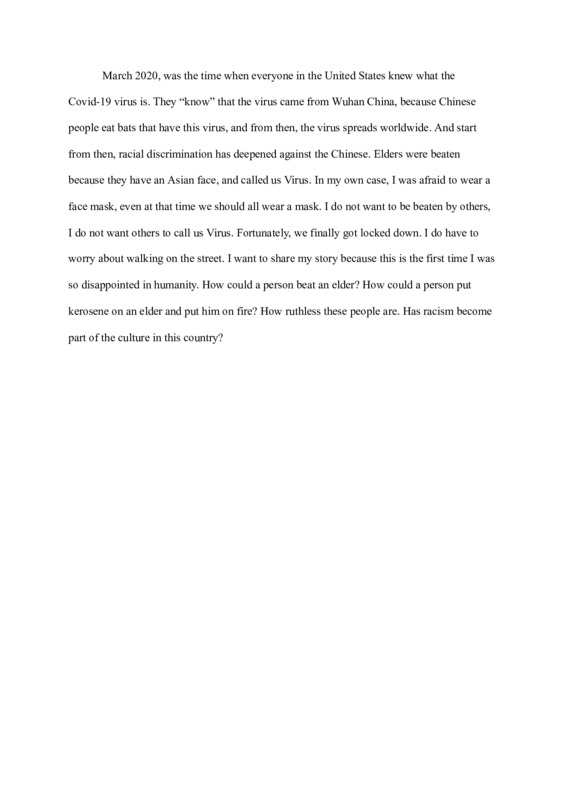 2021-09-15
2021-09-15A Story From A Chinese Immigrant In The US
I will share my story that is about racism because of Covid-19 -
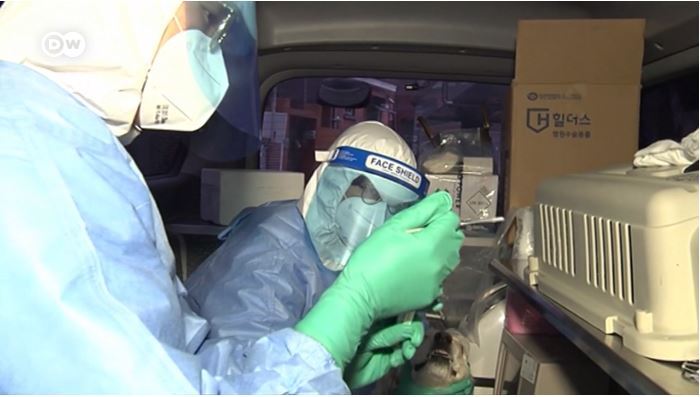 2021-02-10
2021-02-10Seoul offers COVID-19 tests for pet dogs and cats
Efforts are underway in Seoul to reduce the spread of COVID-19 among the pet population. The South Korean capital is offering free testing for cats and dogs exposed to carriers of the disease. The campaign to test and isolate pets comes just weeks after a kitten in Seoul became South Korea's first confirmed case of an animal with COVID-19. -
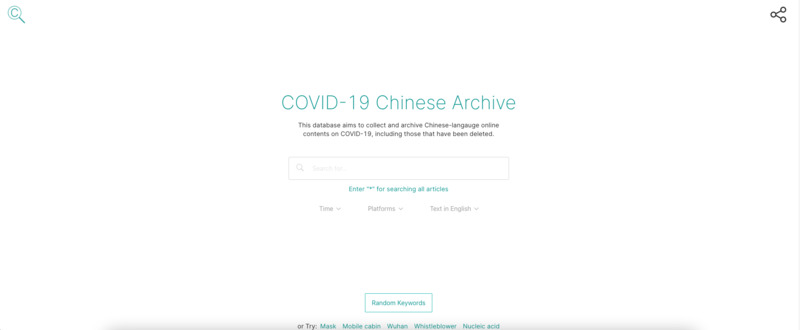 2019-01-01
2019-01-01COVID-19 Chinese Archive
This database aims to collect and archive Chinese online contents on COVID-19, including those that have been deleted. The platform is built as a search engine in English, it can be used by world-wide researchers to conduct further study about the COVID-19 in China. -
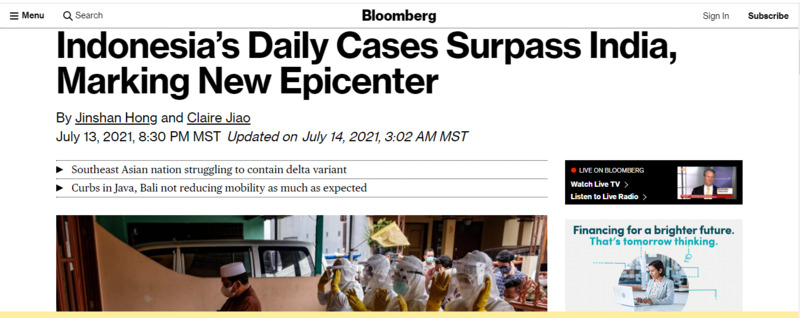 2021-07-13
2021-07-13Indonesia’s Daily Cases Surpass India, Marking New Epicenter
Indonesia surpassed India’s daily Covid-19 case numbers, marking a new Asian virus epicenter as the spread of the highly-contagious delta variant drives up infections in Southeast Asia’s largest economy. The country has seen its daily case count cross 40,000 for three straight days -- including a record high of 54,517 on Wednesday -- up from less than 10,000 a month ago. Officials are concerned that the more transmissible new variant is now spreading outside of the country’s main island, Java, and could exhaust hospital workers and supplies of oxygen and medication. Indonesia’s current numbers are still far from India’s peak of 400,000 daily cases in May, and its total outbreak of 2.7 million is barely a tenth of the Asian giant’s 30.9 million. India, with a population roughly five times the size of Indonesia’s 270 million people, saw daily infections drop below 39,000 on Wednesday as its devastating outbreak wanes. The Southeast Asian country reported about 900 deaths daily on average in the past seven days -- compared to just 181 a month ago -- while India reported an average of 1,027 daily fatalities. -
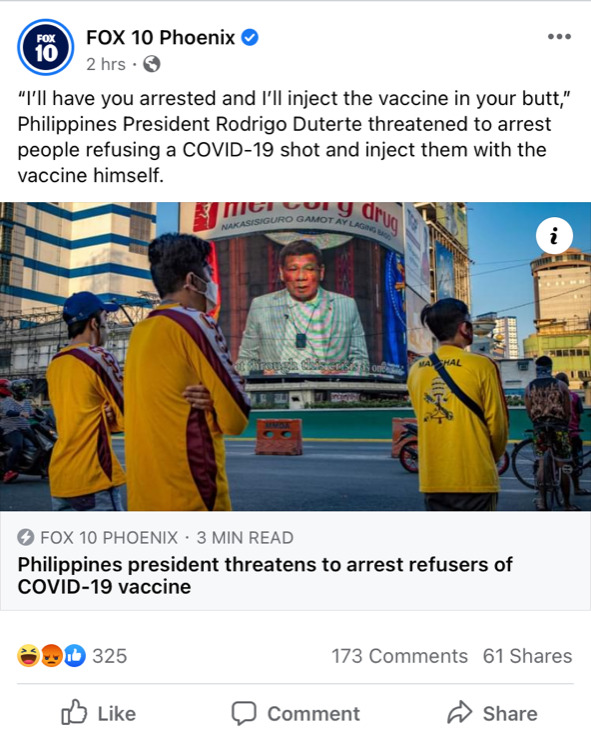 2021-06-24
2021-06-24Philippines president threatens to arrest refusers of COVID-19 vaccine
MANILA, Philippines - Philippines President Rodrigo Duterte on Monday threatened to imprison citizens who refuse to get a COVID-19 vaccine as the nation continues to be a hotspot for the novel coronavirus in Asia. The country has recorded more than 1.3 million COVID-19 cases and over 23,000 deaths. -
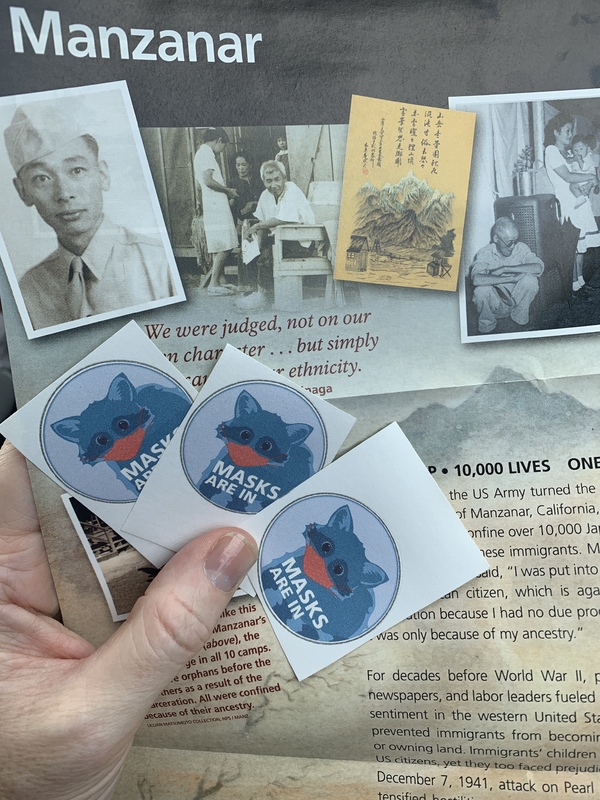 2021-07-10
2021-07-10Manzanar
As a historian, US History teacher, and mother of two Asian-American children, I make a point to expose my children to all aspects of America’s history: good, bad, and ugly. Thanks to COVID, we had the opportunity to show the kids one of the country’s ugliest moments - Japanese internment. The desolate desert in the middle of our home state is an area I had never driven through before COVID, despite having lived in CA my entire life and being (supposedly) 8th or 9th generation Californian on my dad’s side. However, there is no way I’m putting my family on an airplane during a pandemic, which limits vacation options. So into the car for an eight hour drive to Tahoe. A drive that goes right past Manzanar, the Japanese American World War II concentration camp. Unlike last year, when we made the same drive for the first time in my life, the exhibits, buildings, and visitor center were open with masks and social distancing. As we stood in the barrack in the 106 degree temperature, I told my kids to never forget how uncomfortable they felt and to consider the fact that they were feeling awful from the heat as tourists. I told them to imagine living in this heat as a prisoner though you committed no crime except having ancestors from Japan. They may be young, but they are old enough to understand human rights. Visiting Manzanar was overwhelming. I am not a very emotional person, but I was taken aback by the fact that this history is so recent. My best friend’s dad was born in Tule Lake, where Japanese-Americans who refused to take the forced loyalty oath were sent. That is only one generation before mine. Seeing and experiencing second hand through family and friends the hatred directed toward Asian-Americans during this pandemic made the experience in Manzanar extra raw. Though I refuse to thank COVID for anything because I think that’s a bit tone deaf for all who have lost and suffered during this pandemic, I am grateful that the circumstances that led us to drive to Tahoe instead of fly led us also to a place of reflection on prejudice and race, especially in the climate of today. -
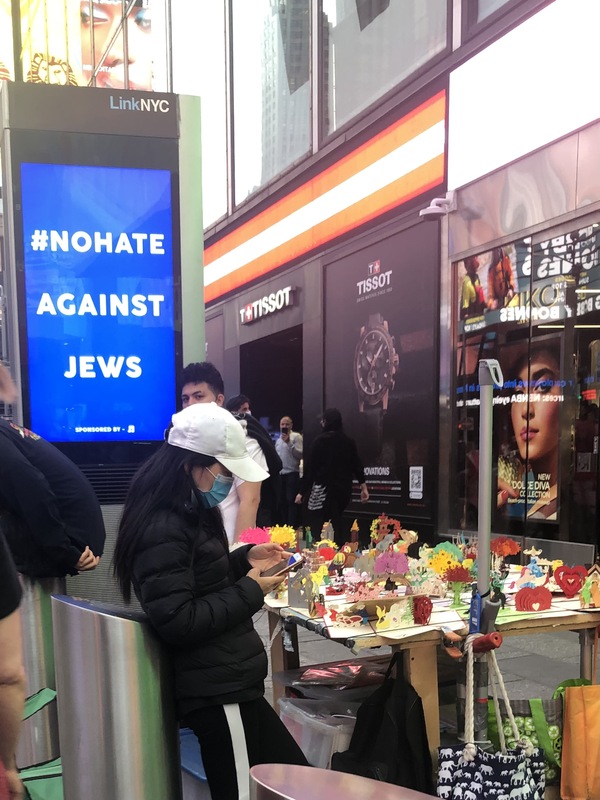 2021-06-14
2021-06-14Anti-racism advertisements at Times Square
These are two photos of anti-racist advertisements I saw in Times Square on June 14, 2021. One is an advertisement on a digital advertisement board that says "#NOHATE AGAINST JEWS" in white text on a blue background, while the other is a poster on the side of a garbage receptacle that says "FIGHT THE VIRUS NOT THE PEOPLE #STOPASIANHATE", made by artist Zipeng Zhu. -
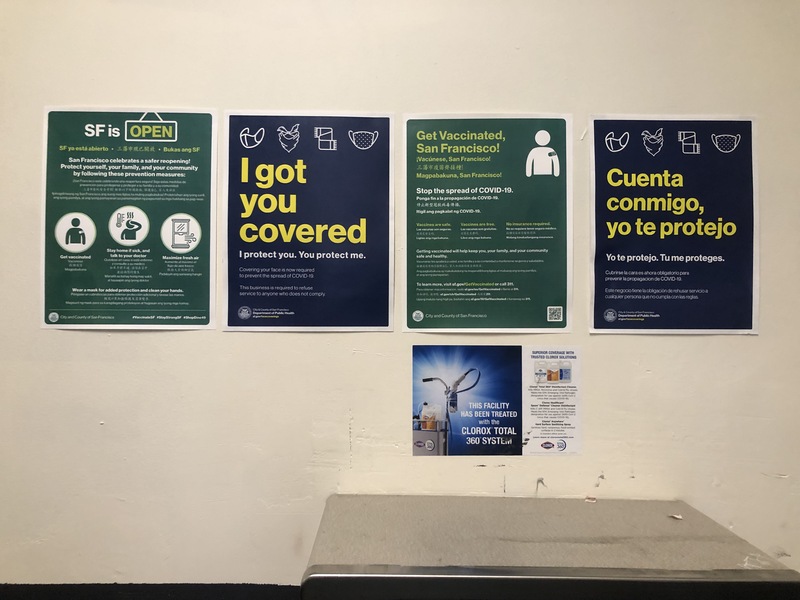 2021-06-25
2021-06-25English, Spanish, Mandarin, Tagalog COVID signs in SF
On June 25th, I saw this set of posters next to a bathroom in Japan Center, a Japanese shopping center in San Francisco. The posters are in English, Spanish, Mandarin, and Tagalog. -
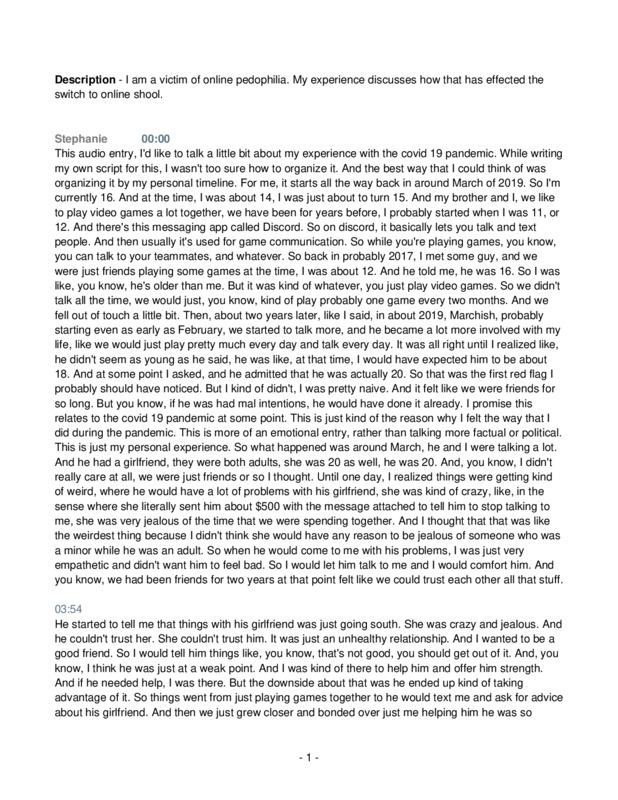 2021-05-25
2021-05-25Stephanie Oral History, 2021/05/25
I am a victim of online pedophilia. My experience discusses how that has effected the switch to online school. -
 2021-05-21
2021-05-21The life of an ordinary person in the epidemic
It is a warning to help people appreciate life and be in awe of nature once more. This incident changed my perspective on a world that was totally different from what I had expected. For example, tensions between parties, nations, and races, as well as resistance and compromise between humans and power, all motivated me to consider the meaning of survival and fight. -
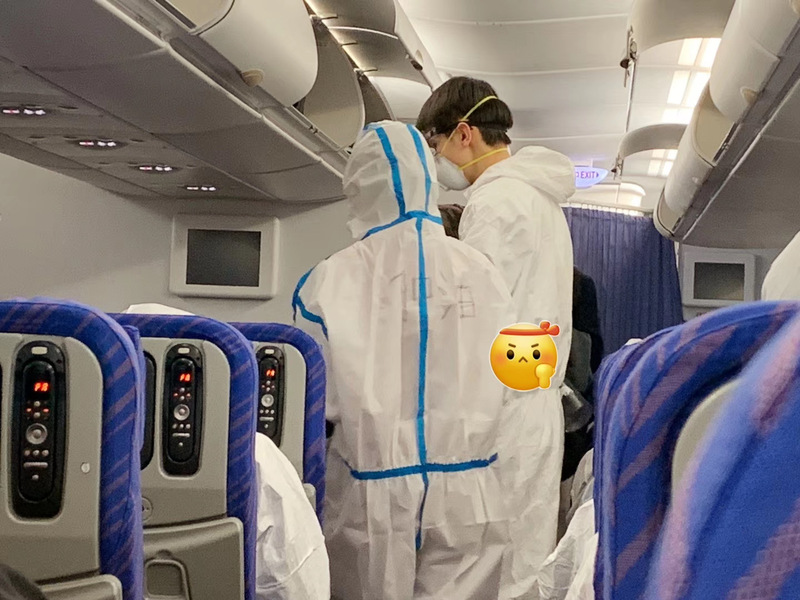 2020-03-26
2020-03-26A Long Way Home
As an international student from China, one of my most impressive experiences about COVID-19 was the long journey when my friends and I returned home from Denver to Beijing. We knew this journey home is bound to be challenging since it happened at such a particular time. The first challenge we faced is to make preparation for the flight. Getting on a flight successfully is largely a matter of luck, as you never know if your flight will be canceled just before the departure date. Due to changing flight policies, our tickets were canceled three times. At that time, my friends and I felt deep powerlessness in the unstable situation. Fortunately, after the fourth flight adjustment, we successfully boarded the journey home. To prevent being infected by coronavirus at the crowded airport, we armed ourselves to the teeth. We wore medical gloves and masks, raincoats (because protective suits were sold out), and we even prepared ski goggles since the safety goggles were sold out too. During the 18 hours on the plane, we just ate a few bars of chocolate and drank some water. And that was the second challenge we faced. However, thanks to the company and encouragement of my two friends that made our time on the plane less stressful and depressed. When we arrived wearily in Guangzhou, we found out a new policy just published that requires returnees to be quarantined as soon as they got off the plane. Therefore, we had to cancel the ticket from Guangzhou to Beijing. As soon as we got off the plane we were taken to a local hotel where we are going to be quarantined for 14 days. During the quarantine, I went through an experience I never had before. Food is delivered to us every day by staff wearing protective suits. And we measured our body temperature at regular intervals every day. In order to overcome the loneliness during the 14 days, my friends and I created an online meeting room, which made us feel that we are eating and studying together. Finally, 16 days after leaving Denver, my friends and I returned to our hometown Beijing. For me, there is nothing happier than seeing my parents in person and eating food cooked by them! My friends and I grew up a lot after going through this experience. This long way home taught us the importance of adjusting mood and supporting each other in times of crisis. -
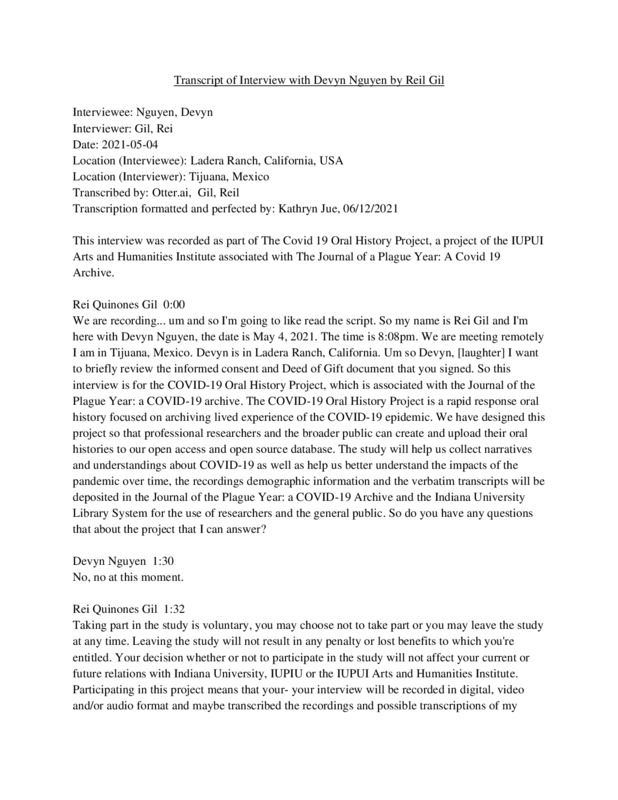 05/04/2021
05/04/2021Devyn Nguyen Oral History, 2021/05/04
Interviewee discussed what life is like graduating during the pandemic, working in a small family-owned business and the pushback against COVID safety in Orange County. She describes how the pandemic has brought her family together along with the tight-knit community with similar social values she has created. -
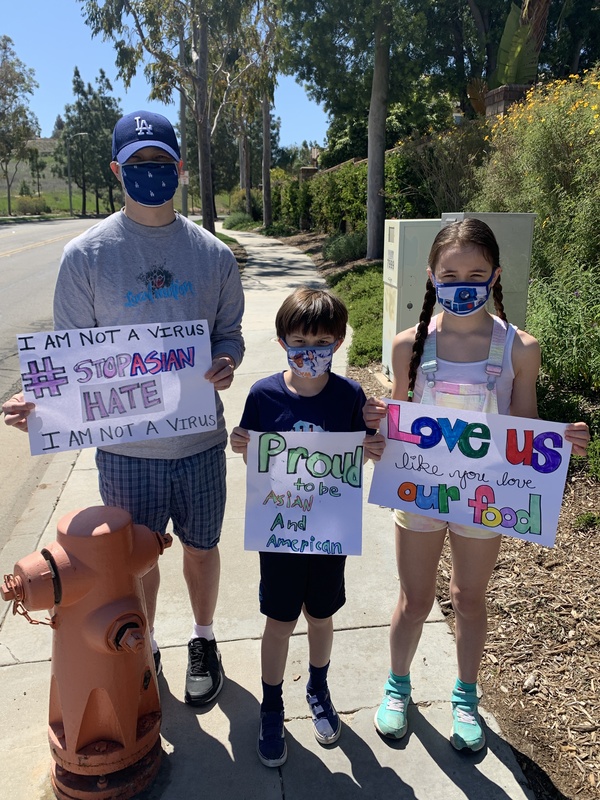 2021-03-27
2021-03-27Stop Asian Hate!
The rise in Asian hate crimes has gone hand in hand with COVID. This certainly was not helped by the previous administration continually referring to COVID as “China Flu” or “Kung Flu.” One of the more horrifying things is how close to home these incidents are happening. Just this month, there were two attacks at a local park on Asian Americans. One was on a Japanese-American Olympian, who was in training. The other was on an elderly Korean-American couple. I live in Southern CA, which has the third highest proportion of the population identifying as Asian, yet even here, racism and racially motivated violent crimes are happening. If there is any positive that is coming out of this, it is the honest conversations we’re having with our children about race. In light of George Floyd and similar situations, the immigrant population at the border, and anti-Asian crimes, our kids are engaged in an active dialogue about equity, prejudice, racism and our response to it. My children are proud to be Asian-American and seeing that pride and them use their voices, even in a small way, makes me hopeful for positive change. Like their signs say, they are proud to be Asian AND American, and to love them like people love Asian food! Oh yeah, and in this pandemic year, a reminder that they are not a virus. -
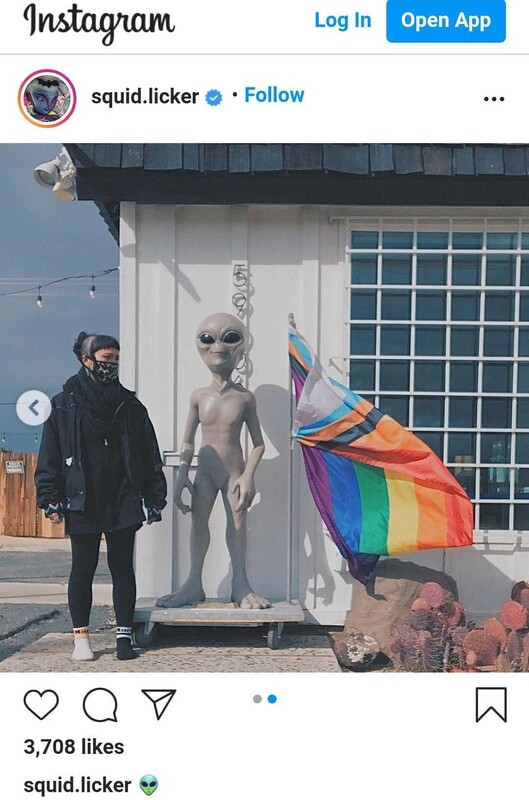 2021-04
2021-04Pandemic Street Art: Lauren YS/squidlicker and #stopaapihate
Los Angeles-based artist Lauren YS, aka squid.licker, is well known world-wide for their mural street art. During the pandemic, they put up a mural at 1700 Naud Street in Los Angeles that reads, "Stop Asian Hate Crimes" and "Protect Our Elders." Also shown are "Stop Asian Hate" posters, with proceeds going to @stopasianhate and @squidtropica. -
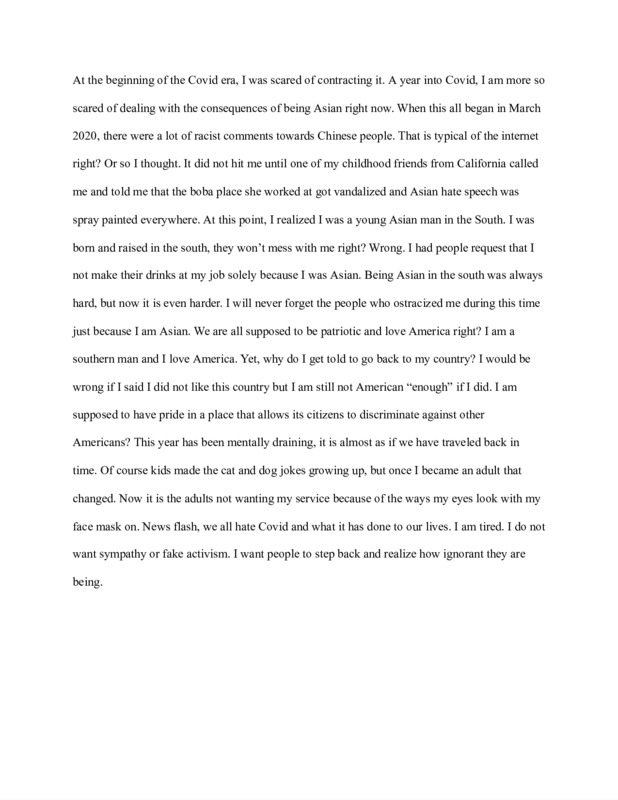 2021-04-12
2021-04-12Being Asian During Covid
This piece describes the minor hardships I have experienced during Covid as a young man who happens to be Asian. -
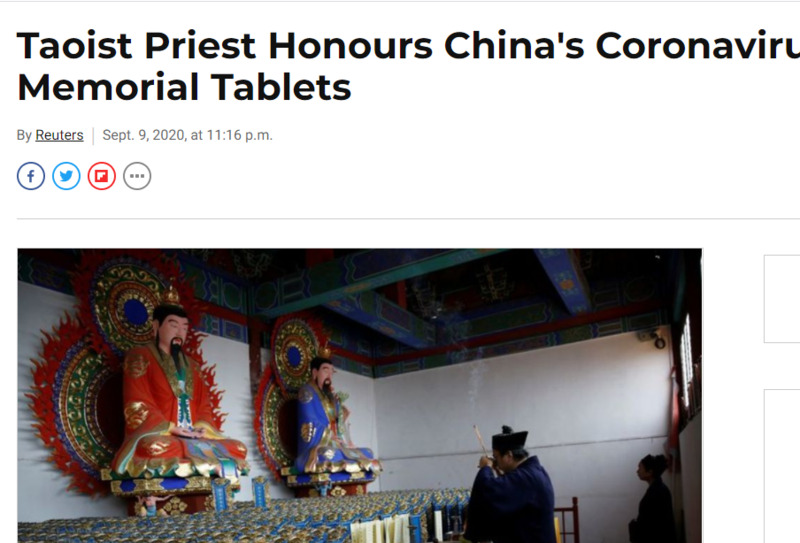 2020-09-09
2020-09-09Taoist Priest Honours China's Coronavirus Dead With Memorial Tablets
In China, there are only a small number of state-approved religions. Taoism, or Daoism, is one of the approved religions. As COVID-19 began in China, many were quickly infected and died as it was a new virus about which little was known. This article discusses how a Taoist priest in China honors those who died of COVID-19. Taoism, as a religion, has a unique history as originally the religion began as a philosophy. Thus, there are very unique ways of thinking in the heavily philosophical religion. Memorializing the dead is extremely important in Taoism, because as the article relays, true death within the system of Taoism only occurs when one is completely forgotten. In order to make sure people are remembered, the priests create memorial tablets for the dead. -
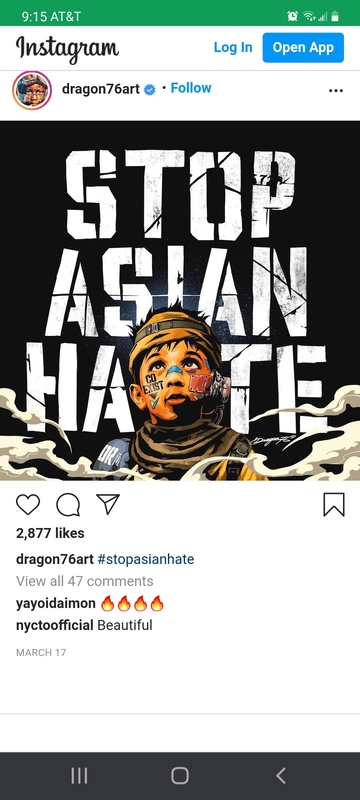 2021-03-17
2021-03-17Pandemic Street Art: Dragon76 says, "Stop Asian Hate"
Japanese, New York-based street artist DRAGON76 has just completed a mural in East Village, Manhattan, supporting the “STOP ASIAN HATE” movement. The “STOP ASIAN HATE” mural can be found at East Village, 75 Chrystie St, Lower East Side, Manhattan.
